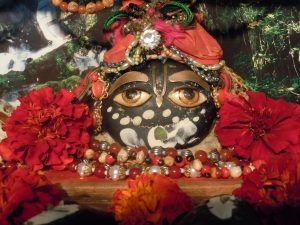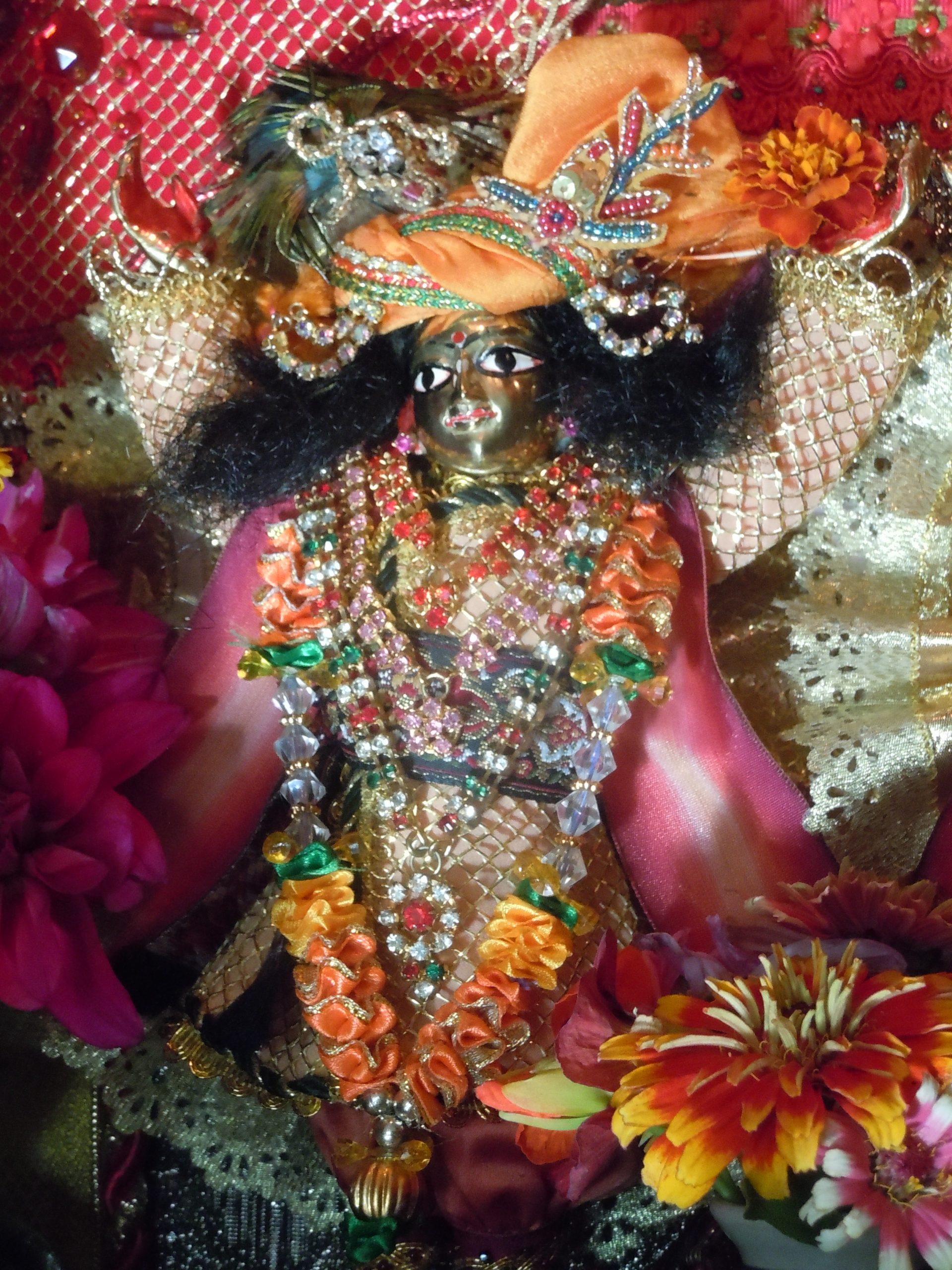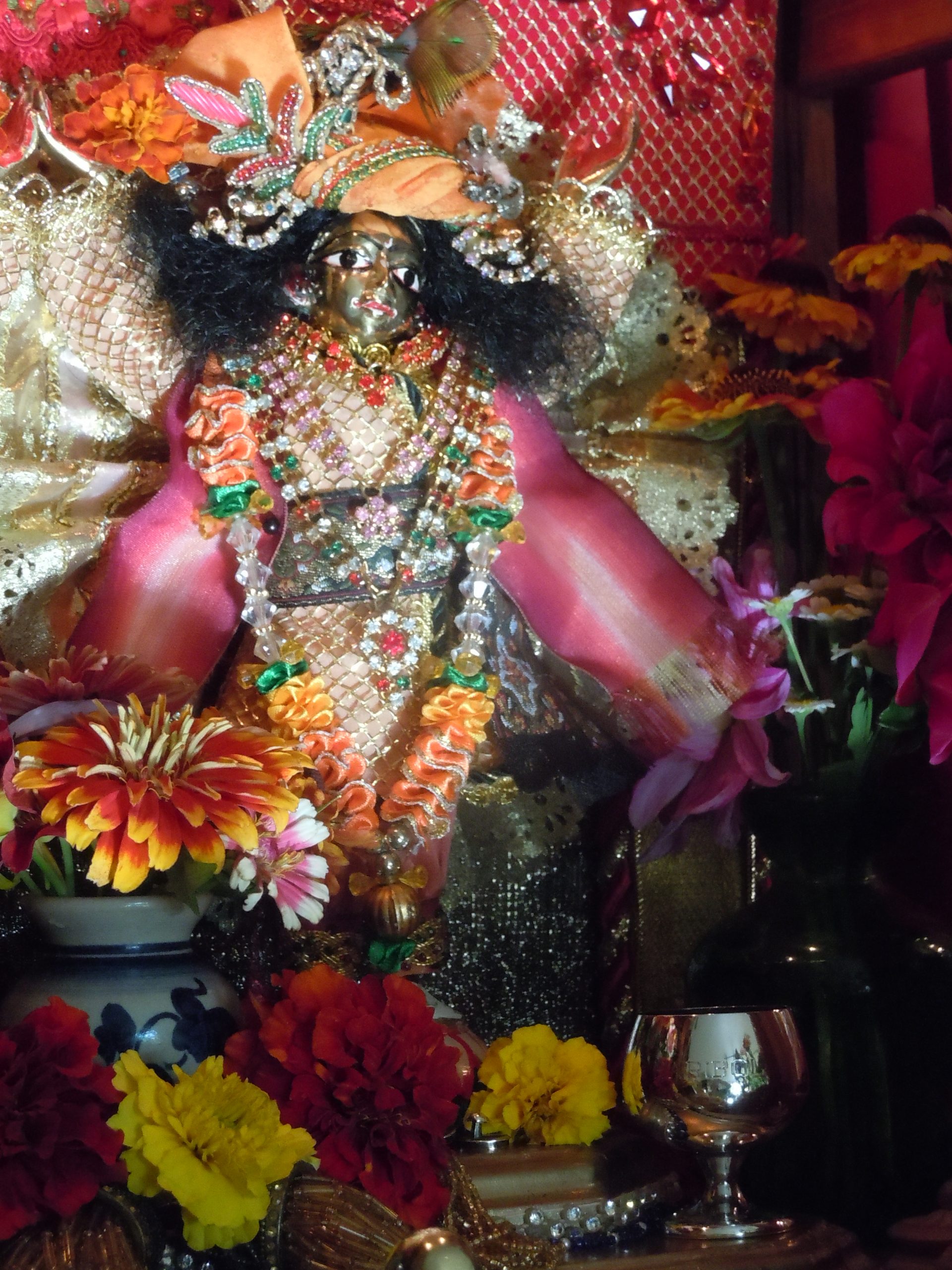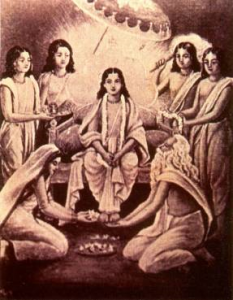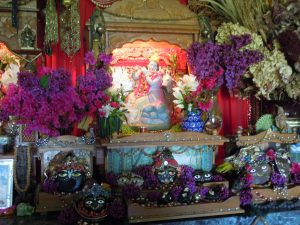Antya 1.96-The Lord inquired, “What kind of book are you writing?” He held up a palm leaf that was a page of the manuscript, and when He saw the fine handwriting, His mind was very pleased.
Antya 1.97--Thus being pleased, the Lord praised the writing by saying, “The handwriting of Rūpa Gosvāmī is just like rows of pearls.”
Antya 1.98-While reading the manuscript, Śrī Caitanya Mahāprabhu saw a verse on that page, and as soon as He read it He was overwhelmed by ecstatic love.
Antya 1.99-“I do not know how much nectar the two syllables ‘Kṛṣ-ṇa’ have produced. When the holy name of Kṛṣṇa is chanted, it appears to dance within the mouth. We then desire many, many mouths. When that name enters the holes of the ears, we desire many millions of ears. And when the holy name dances in the courtyard of the heart, it conquers the activities of the mind, and therefore all the senses become inert.”
PURPORT-This verse is included in the Vidagdha-mādhava (1.15), a seven-act play written by Śrīla Rūpa Gosvāmī describing the pastimes of Śrī Kṛṣṇa in Vṛndāvana.
Antya 1.100-When Śrī Caitanya Mahāprabhu chanted this verse, Haridāsa Ṭhākura, upon hearing the vibration, became jubilant and began dancing and praising its meaning.
Antya 1.101-–One has to learn about the beauty and transcendental position of the holy name of the Lord by hearing the revealed scriptures from the mouths of devotees. Nowhere else can we hear of the sweetness of the Lord’s holy name.
PURPORT-It is said in the Padma Purāṇa, ataḥ śrī-kṛṣṇa-nāmādi na bhaved grāhyam indriyaiḥ. Chanting and hearing of the transcendental holy name of the Lord cannot be performed by the ordinary senses. The transcendental vibration of the Lord’s holy name is completely spiritual. Thus it must be received from spiritual sources and must be chanted after having been heard from a spiritual master. One who hears the chanting of the Hare Kṛṣṇa mantra must receive it from the spiritual master by aural reception. Śrīla Sanātana Gosvāmī has forbidden us to hear the holy name of Kṛṣṇa chanted by non-Vaiṣṇavas, such as professional actors and singers, for it will have no effect. It is like milk touched by the lips of a serpent, as stated in the padma purāṇa: avaiṣṇava-mukhodgīrṇaṁ pūtaṁ hari-kathāmṛtam śravaṇaṁ naiva kartavyaṁ sarpocchiṣṭaṁ yathā payaḥ As far as possible, therefore, the devotees in the Kṛṣṇa consciousness movement gather to chant the holy name of Kṛṣṇa in public so that both the chanters and the listeners may benefit.
Some Conclusions—The main point being made here is that anybody can chant God’s name, but the real benefit (love of God) only can come from the Lords pure devotees. Many diferent religions teach their followers to chant Gods names as they know them, but none of these religions know anything about the offenses to their chanting of the Lords Holy Names.
Hare Krsna
damaghosa das
———————
SB 6.3.24-Therefore it should be understood that one is easily relieved from all sinful reactions by chanting the holy name of the Lord and chanting of His qualities and activities. This is the only process recommended for relief from sinful reactions. Even if one chants the holy name of the Lord with improper pronunciation, he will achieve relief from material bondage if he chants without offenses. Ajāmila, for example, was extremely sinful, but while dying he merely chanted the holy name, and although calling his son, he achieved complete liberation because he remembered the name of Nārāyaṇa.
PURPORT
In the assembly of Raghunātha dāsa Gosvāmī’s father, Haridāsa Ṭhākura confirmed that simply by chanting the holy name of the Lord one is liberated, even if he does not chant completely inoffensively. Smārta-brāhmaṇas and Māyāvādīs do not believe that one can achieve liberation in this way, but the truth of Haridāsa Ṭhākura’s statement is supported by many quotations from Śrīmad-Bhāgavatam.
In his commentary on this verse, for example, Śrīdhara Svāmī gives the following quotation: sāyaṁ prātar gṛṇan bhaktyā duḥkha-grāmād vimucyate
“If one always chants the holy name of the Lord with great devotion in the evening and in the morning, one can become free from all material miseries.” Another quotation confirms that one can achieve liberation if one hears the holy name of the Lord constantly, every day with great respect (anudinam idam ādareṇa śṛṇvan).
Śrīdhara Svāmī also quotes from the Purāṇas, pāpa-kṣayaś ca bhavati smaratāṁ tam ahar-niśam: “One can become free from all sinful reactions simply by remembering the lotus feet of the Lord day and night [ahar-niśam].”
Furthermore, he quotes from Bhāgavatam (6.3.31): All these quotations prove that one who constantly engages in chanting and hearing of the holy activities, name, fame and form of the Lord is liberated. As stated wonderfully in this verse, etāvatālam agha-nirharaṇāya puṁsām: simply by uttering the name of the Lord, one is freed from all sinful reactions.
The word alam, which is used in this verse, indicates that simply uttering the holy name of the Lord is sufficient. This word is used with different imports. As stated in the Amara-kośa, the most authorized dictionary in the Sanskrit language, alaṁ bhūṣaṇa-paryāpti-śakti-vāraṇa-vācakam: the word alam is used to mean “ornament,” “sufficiency,” “power” and “restraint.” Here the word alam is used to indicate that there is no need of any other process, for the chanting of the holy name of the Lord is sufficient. Even if one chants imperfectly, one becomes free from all sinful reactions by chanting.
This power of chanting the holy name was proved by the liberation of Ajāmila. When Ajāmila chanted the holy name of Nārāyaṇa, he did not precisely remember the Supreme Lord; instead, he remembered his own son. At the time of death, Ajāmila certainly was not very clean; indeed, he was famous as a great sinner. Furthermore, one’s physiological condition is completely disturbed at the time of death, and in such an awkward condition it would certainly have been very difficult for Ajāmila to have chanted clearly. Nevertheless, Ajāmila achieved liberation simply by chanting the holy name of the Lord. Therefore, what is to be said of those who are not sinful like Ajāmila? It is to be concluded that with a strong vow one should chant the holy name of the Lord—Hare Kṛṣṇa, Hare Kṛṣṇa, Kṛṣṇa Kṛṣṇa, Hare Hare/ Hare Rāma, Hare Rāma, Rāma Rāma, Hare Hare—for thus one will certainly be delivered from the clutches of māyā by the grace of Kṛṣṇa.
The chanting of the Hare Kṛṣṇa mantra is recommended even for persons who commit offenses, because if they continue chanting they will gradually chant offenselessly. By chanting the Hare Kṛṣṇa mantra without offenses, one increases his love for Kṛṣṇa. As stated by Śrī Caitanya Mahāprabhu, premā pum-artho mahān: one’s main concern should be to increase one’s attachment to the Supreme Personality of Godhead and to increase one’s love for Him.
In this regard Śrīla Viśvanātha Cakravartī Ṭhākura quotes the following verse from Śrīmad-Bhāgavatam (11.19.24):“My dear Uddhava, the supreme religious system for human society is that by which one can awaken his dormant love for Me.” Commenting on this verse, Śrīla Viśvanātha Cakravartī Ṭhākura describes the word bhakti by saying premaivoktaḥ. Kaḥ anyaḥ arthaḥ asya: in the presence of bhakti, what is the necessity of liberation?
Śrīla Viśvanātha Cakravartī Ṭhākura also quotes this verse from the Padma Purāṇa:
Even if in the beginning one chants the Hare Kṛṣṇa mantra with offenses, one will become free from such offenses by chanting again and again. Pāpa-kṣayaś ca bhavati smaratāṁ tam ahar-niśam: one becomes free from all sinful reactions if one chants day and night, following the recommendation of Śrī Caitanya Mahāprabhu. It was Śrī Caitanya Mahāprabhu who quoted the following verse:[Adi 17.21]
“In this age of quarrel and hypocrisy the only means of deliverance is chanting the holy name of the Lord. There is no other way. There is no other way. There is no other way.” If the members of the Kṛṣṇa consciousness movement strictly follow this recommendation of Śrī Caitanya Mahāprabhu, their position will always be secure.
Adi 3.79- TRANSLATION
One who says that ten million aśvamedha sacrifices are equal to the chanting of the holy name of Lord Kṛṣṇa is undoubtedly an atheist. He is sure to be punished by Yamarāja.
Purport–In the list of the ten kinds of offenses in chanting the holy name of the Supreme Personality of Godhead, Hare Kṛṣṇa, the eighth offense is dharma-vrata-tyāga-hutādi-sarva-śubha-kriyā-sāmyam api pramādaḥ. One should never consider the chanting of the holy name of Godhead equal to pious activities like giving charity to brāhmaṇas or saintly persons, opening charitable educational institutions, distributing free food and so on. The results of pious activities do not equal the results of chanting the holy name of Kṛṣṇa.
The Vedic scriptures say: go-koṭi-dānaṁ grahaṇe khagasya prayāga-gaṅgodaka-kalpa-vāsaḥ
yajñāyutaṁ meru-suvarṇa-dānaṁ govinda-kīrter na samaṁ śatāṁśaiḥ
“Even if one distributes ten million cows in charity during an eclipse of the sun, lives at the confluence of the Ganges and Yamunā for millions of years, or gives a mountain of gold in sacrifice to the brāhmaṇas, he does not earn one hundredth part of the merit derived from chanting Hare Kṛṣṇa.” In other words, one who accepts the chanting of Hare Kṛṣṇa to be some kind of pious activity is completely misled. Of course, it is pious; but the real fact is that Kṛṣṇa and His name, being transcendental, are far above all mundane pious activity. Pious activity is on the material platform, but chanting of the holy name of Kṛṣṇa is completely on the spiritual plane. Therefore, although pāsaṇḍīs do not understand this, pious activity can never compare to the chanting of the holy name.
